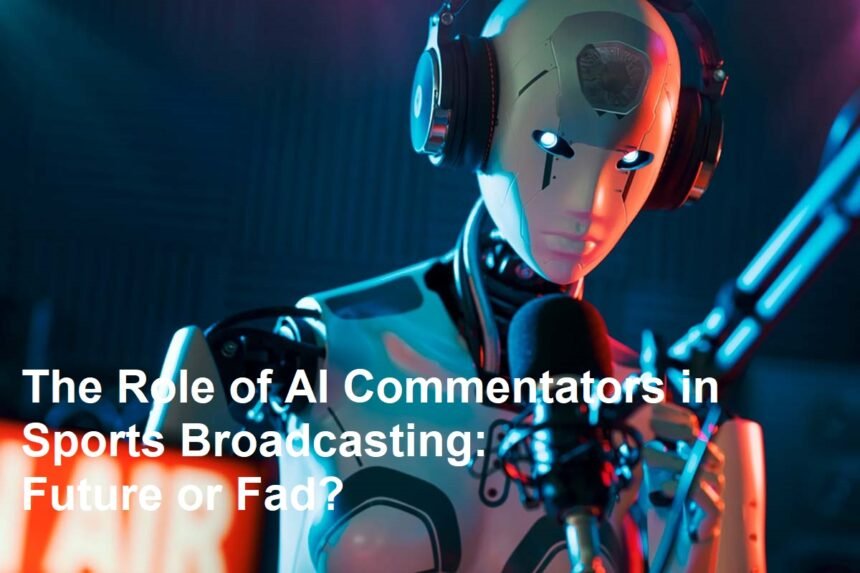Introduction
Imagine tuning in to your favorite game and hearing a commentator who never loses their voice, instantly recalls every stat, and delivers analysis in multiple languages—all powered by artificial intelligence. That’s the promise of AI sports commentators, a growing trend that has everyone asking: is this the future of sports broadcasting, or just another tech fad?
From automated live commentary to data-driven insights, sports broadcasting AI is reshaping how fans experience games. But can machines really replace the passion, humor, and unpredictability of human commentators? Let’s break it down.
What Are AI Sports Commentators?
The Basics
At its core, an AI sports commentator is a system that uses artificial intelligence to provide live commentary during sports events. These systems pull real-time data—like scores, player stats, and play-by-play actions—and turn it into spoken or written commentary.
Types of AI Commentary
- Text-Based: Automated match reports and play-by-play updates.
- Voice-Based: Synthetic voices narrating live games.
- Hybrid Systems: Combining human anchors with AI-driven insights for deeper coverage.
How Automated Live Commentary Works
Data Collection
AI pulls real-time stats from sensors, cameras, and official feeds.
Natural Language Generation (NLG)
The system translates raw numbers into sentences like, “That’s Smith’s third touchdown of the season.”
Delivery
The commentary can be broadcast via text (apps, websites) or voice (TV, streaming, or smart speakers).
Practical Tip: Fans can already try AI-driven live updates through sports apps—handy if you’re stuck at work but want quick, accurate play-by-play action.
Benefits of AI in Sports Broadcasting
Speed and Accuracy
AI doesn’t miss a beat. Stats and plays are reported instantly with no lag.
Multilingual Coverage
One game can have AI commentary available in dozens of languages, making sports more global than ever.
Cost Efficiency
For smaller leagues or niche sports, sports broadcasting AI lowers production costs while still offering professional-level coverage.
Accessibility
AI can provide commentary tailored for different audiences—for example, simplified narration for casual fans or detailed analytics for hardcore viewers.
The Human Touch: Can AI Replace Emotion?
Strengths of Human Commentators
- Storytelling and emotional connection.
- Spontaneous humor and cultural references.
- Ability to read the atmosphere of the stadium.
Where AI Falls Short
While AI can mimic tone, it still struggles with nuance. For example, reacting to a shocking upset or making a witty joke isn’t as natural for a machine.
Practical Tip: Expect hybrid broadcasts to dominate—where humans provide passion and storytelling, while AI supports with stats and instant replays.
Real-World Examples of Sports Broadcasting AI
The BBC and Automated Commentary
The BBC has tested AI-generated match reports for lower-tier football games, freeing up human reporters for bigger events.
Olympic Coverage
In past Olympic Games, AI-driven translation and commentary tools were used to make real-time broadcasts accessible to a global audience.
Niche Sports
Sports like esports, table tennis, or regional leagues benefit from automated commentary because budgets are smaller but demand for coverage is high.
Challenges Facing AI Sports Commentators
Accuracy Under Pressure
AI sometimes misinterprets data—like confusing an offside play or misidentifying a player.
Lack of Creativity
Machines don’t (yet) create memorable catchphrases like “GOOOOAL!” or “Do you believe in miracles?!”
Fan Acceptance
Many fans still prefer the excitement and personality of human broadcasters.
Ethical Concerns
Replacing human jobs with automation raises questions about the future of sports media careers.
Practical Tips: How Fans and Broadcasters Can Embrace AI
For Broadcasters
- Use AI as a Co-Commentator: Let humans lead, with AI supplying instant stats and context.
- Experiment with Languages: Offer commentary in new markets using AI translation.
- Leverage AI for Smaller Events: Cover minor leagues or training matches at lower cost.
For Fans
- Try AI-Enhanced Apps: Many sports apps already use AI to deliver real-time match summaries.
- Follow Both Formats: Enjoy human-led commentary for big games, but use AI updates when multitasking.
- Stay Open-Minded: AI in broadcasting is still evolving—today’s robotic voice may be tomorrow’s lifelike storyteller.
The Future of AI in Sports Broadcasting
Smarter Narration
As natural language models evolve, commentary will sound more human, with smoother flow and richer context.
Personalized Commentary
Fans might choose what type of commentary they want—casual, technical, humorous, or even focused only on their favorite player.
Integration with Augmented Reality
Imagine wearing AR glasses at a stadium and seeing real-time stats narrated by an AI commentator floating above the field.
Coexistence, Not Replacement
It’s unlikely that AI sports commentators will fully replace humans. Instead, expect a partnership: AI handles the data-heavy side, while humans bring storytelling and passion.
Conclusion: Future or Fad?
So, is the rise of AI sports commentators a fleeting trend or the future of broadcasting? The answer is somewhere in between. While automated live commentary offers speed, multilingual reach, and cost savings, it can’t yet replicate the charisma of human broadcasters.
Most likely, the future is hybrid: sports broadcasting AI will power data insights and accessibility, while human voices continue to capture the drama and heart of sports.
Now it’s your turn! Do you think AI commentators could ever replace humans, or should they always stay as sidekicks to the pros? Share your thoughts in the comments below!












